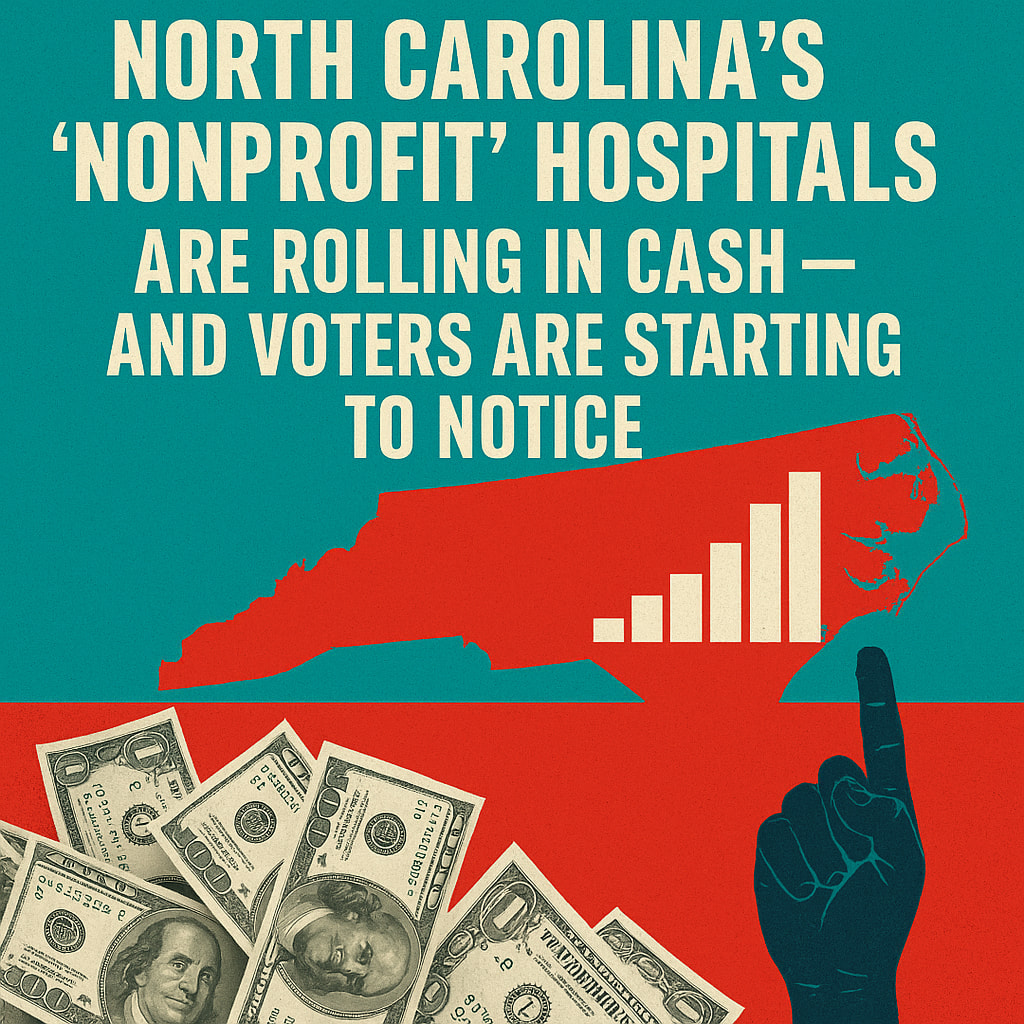|
 |
North Carolina’s “Nonprofit” Hospitals Are Rolling in Cash — and Voters Are Starting to Notice
our North Carolina hospital systems call themselves “nonprofit.” Their profits, perks, and CEO salaries tell a different story — and new reforms could finally hit their bottom line.
America’s big “nonprofit” hospitals are looking a lot like Fortune 500 companies with better PR.
A new report in City Journal shines a harsh light on a system that’s supposed to serve the public — but often acts like a profit machine hiding behind a halo. These tax-exempt medical mega-empires rake in billions, pay CEOs like hedge-fund managers while charging patients sky-high prices.
And nowhere is that more obvious than in North Carolina, where four nonprofit giants dominate the healthcare landscape: Atrium Health, Duke University Health System, UNC Health, and Novant Health.
Let’s take a closer look at who they are — and why looming reforms could finally hit them where it hurts: in the wallet.
The Big Four
Atrium Health (Charlotte): The heavyweight champ. With more than 40 hospitals and tens of thousands of employees, Atrium pulls in over $12 billion a year. It calls itself “not-for-profit,” but last year it pocketed a cool $1.4 billion in profit. Its CEO, Eugene Woods, made more than $14 million.
Atrium also enjoys hundreds of millions in tax breaks — all while suing patients over unpaid bills and fighting to keep its prices secret.
Duke University Health System (Durham): The academic empire. Duke Health’s 2024 revenue topped $6.8 billion, and it’s known for world-class medicine — and world-class markups. Duke enjoys university-style tax exemptions and sits on endowments that most states would envy. If reforms clamp down on nonprofit perks, Duke’s balance sheet will feel it.
UNC Health (Chapel Hill): The state-affiliated network with a hometown reputation, but massive scale. UNC runs hospitals from the mountains to the coast and takes in billions in government payments. It’s less flashy than Atrium or Duke but still benefits from generous tax breaks and an opaque definition of “community benefit.”
Novant Health (Winston-Salem/Charlotte): The quiet operator that plays in the same league. Novant made roughly $10.17 billion in 2024 and keeps expanding into lucrative suburban markets. The system also declared over $1.6 billion in community benefit — including financial assistance and unpaid Medicare/Medicaid costs.
Like its peers, it pays no property tax on its hospitals — a gift worth millions every year.
The Tax-Free Elephant in the Room
Here’s the deal: these hospitals are classified as nonprofits, which means they don’t pay income tax, property tax, or most sales taxes.
In theory, that’s the government’s way of rewarding them for providing charity care, free or discounted treatment for people who can’t afford it.
In practice, as City Journal points out, many of these institutions spend far less on charity care than they save in tax breaks. The gap runs into hundreds of millions of dollars.
That’s the issue firing up both Democrats and Republicans: Are these hospitals really public servants — or just private corporations in nonprofit drag?
What Reforms Could Do
Congress and several state legislatures are eyeing new rules that would force hospitals to prove they deserve their tax perks. Among the ideas floating around:
Minimum levels of charity care spending to keep tax-exempt status.
Public reporting of executive pay, property holdings, and collection practices.
Penalties for “nonprofit” hospitals that act like for-profits — including lawsuits, liens, or aggressive billing.
Stronger enforcement of federal price-transparency laws, which many big hospitals still ignore.
If even half of these reforms pass, North Carolina’s top systems will have to adjust fast.
Atrium alone could lose hundreds of millions in tax breaks. Duke might face pressure to slash prices or justify its charitable footprint.
UNC and Novant could be forced to open their books and explain why their “nonprofit” margins look so healthy.
Why Voters Should Care
This isn’t just about hospital CEOs and politicians — it’s about your money.
Every dollar hospitals dodge in taxes is a dollar local governments can’t spend on roads, schools, or cops. It’s also money that could keep insurance premiums or medical bills lower.
When a “charitable” hospital sues patients, pays its CEO eight figures, and sits on prime tax-exempt real estate, that’s not charity, it’s corporate behavior with a halo.
The reforms now on the table could finally force them to play by the rules they claim to follow.
And that could mean:
Lower prices at the ER.
More free care for working-class families.
Less tax burden on everyone else.
Bottom Line
North Carolina’s hospital giants have done plenty of good — saving lives, creating jobs, and teaching the next generation of providers.
But they’ve also mastered the art of talking like charities while operating like monopolies.
If the proposed reforms stick, Atrium, Duke, UNC, and Novant will have to prove their halo isn’t just for show. The era of tax-free healthcare giants coasting on goodwill may finally be coming to an end — and not a moment too soon.
You're currently a free subscriber to NC Political Tea. For the full experience, upgrade your subscription.
